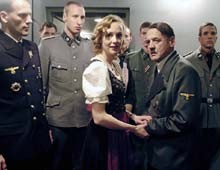Germans come to terms with their past and the Führer who ducked his own reckoning
| Actor Bruno Ganz, best known to American audiences as the wise, wistful angel of Wings of Desire, brings human scale to the 20th-century's most terrifying villain in Der Untergang (Downfall), a German film about the final days leading up to Hitler's suicide. |
For almost 40 years, Germans have observed an unofficial taboo against portraying Hitler, lest they seem to be arousing sympathy for the devil. As early as 1940, Charles Chaplin aped Hitler in The Great Dictator, and one of the Three Stooges, Tom Dugan, impersonated him in 1942 in To Be or Not to Be. But for German actors, the stakes have been nothing less than national rehabilitation. Though Downfall aroused controversy when released last year in Germany, it is not likely to inspire Neo-Nazi recruitment. With documentary precision, it reenacts the final 10 days of the megalomaniacal chancellor whose reign of terror caused 50 million deaths.
Though best known as the sweetly melancholic angel in Wings of Desire, Bruno Ganz transforms himself into a thoroughly believable Hitler, a leader who alternates between certainty in ultimate victory and self-pitying despair over treachery by his generals, "international Jewry," and the German people. "No one understands me, not even my closest comrades," he whines, but this film takes the measure of a man who created a culture of death that ends up consuming him. Hitler is surrounded and supported by sycophants, cynics, sybarites, and lunatics. For all the footage of mayhem in the streets outside the bunker, the most chilling moment occurs when Magda Goebbels (Matthes), a true believer to the end, poisons her six children, declaring, "I won't let the children grow up in a world in which there is no National Socialism."
| Downfall (Der Untergang) Dir. Oliver Hirschbiegel; writ. Bernd Eichinger, from books by Joachim Fest and Traudl Junge; feat. Bruno Ganz, Alexandra Maria Lara, Corinna Harfouch, Ulrich Matthes, Juliane Koehler (R) |
Schenck, a medical official whose principal concern is alleviating the enormous suffering during the siege of Berlin, represents the decent German. While colleagues exploit their privileges to flee, he stays behind, struggling to save lives under dreadful conditions. It is through Schenk's eyes that the sots and savages who control the bunker seem a ghastly aberration. It is the triumph of that gaze that offers hope for redemption of his nation and the species. •


